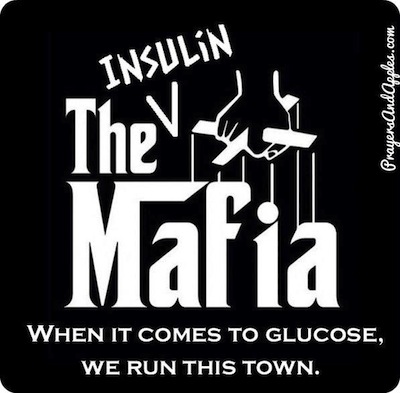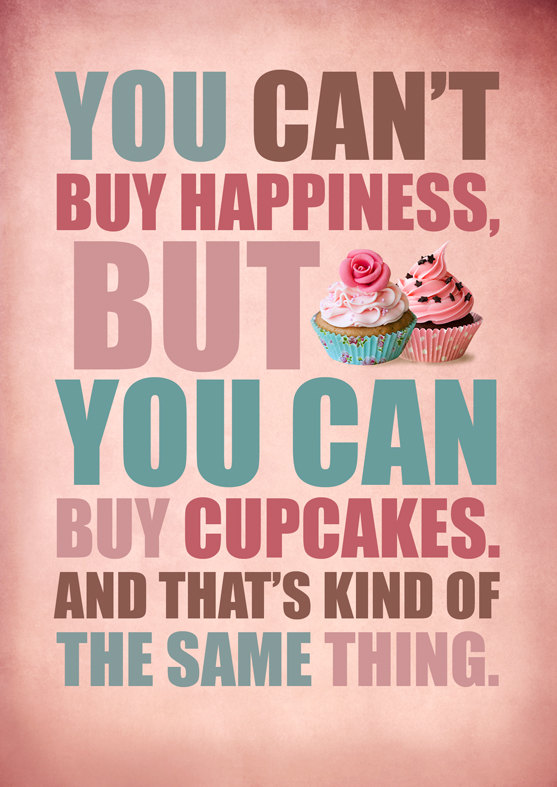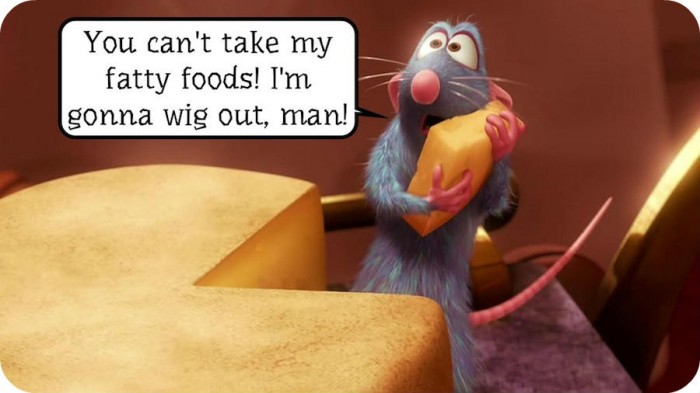Ever wonder why a bowl of ice cream is so calming after a breakup? Or why every time you’re stressed, a home-cooked meal seems to make life that much better?
Well, today we have the answer! As well as some good news, some bad news and a whole lotta science – so let’s get to it!
The Good News
It’s not just in your head. Carbs – and comfort foods in general – produce measurable, physiological changes that affect your mood, temperament and energy levels. So when you reach for that piece of pizza after a rough day at work, it’s not just pointless habit. (Well, not completely anyways…) Eating high-carb, high-fat and high-sugar foods actually alters the behavior of neurotransmitters in your brain and signals nervous system activity designed to chill you the heck out. (Maybe not the most eloquent explanation, but I’m not kidding: there’s a whole division of your nervous system devoted entirely to getting you to “rest and digest”.)
So the good news? Comfort food works.
The Bad News
Comfort food works.
According to the National Institute of Mental Health, 40 million Americans over the age of 18 suffer from an anxiety disorder in a given year; 14.8 million suffer from depression. Recognizing that unhealthy food consumption elicits a positive change in patients’ symptoms makes it all the easier to connect the dots between our nation’s mental health crisis and the current obesity epidemic (the Centers for Disease Control and Prevention claim that 69% of U.S. adults over 20 are overweight and/or obese).
In this light, unhealthy eating suggests the same flawed paradigm as antidepressant/ anxiolytic prescription: It produces short-term, often immediate alleviation of certain symptoms – but at the possible detriment of other cognitive and emotional processes and with the heavy burden of impaired physical health.
#sipstea
The Science
Ok, so let’s take a look at what happens when you eat comfort food – especially comfort foods high in carbs, because those are my favorite! ♥
(And when I say ‘carbs’, think more banana bread and less banana…)
Return of the Insulin Mafia
(I know, these guys are everywhere right?! lol)
 We were just talking the other day about glucose and insulin and how the whole dynamic impacts energy. Well, it turns out this same process also contributes to the post-food-state-of-zen you feel after downing a pint of Haagen-Dazs.
We were just talking the other day about glucose and insulin and how the whole dynamic impacts energy. Well, it turns out this same process also contributes to the post-food-state-of-zen you feel after downing a pint of Haagen-Dazs.
In a carmel covered nutshell: Carbs and sugars are converted to glucose in your blood. When glucose levels rise (thanks to that pint of ice cream), your body releases insulin (#insulinmafia #represent) to get things under control. Insulin directs glucose into different cells for energy and storage. Your brain needs glucose too, but it doesn’t store it. So in a perfect world, your brain gets the glucose that isn’t used or stored by the other cells. However, when the glucose/insulin dynamic gets out of whack (say when your body starts flooding your bloodstream with insulin because there’s too much glucose… because you’ve been eating too many unhealthy foods too often…) things get a lil crazy. In a desperate attempt to get all that glucose out of your blood, insulin starts throwing everything into storage – and your brain is left with barely any glucose for energy (i.e., low blood sugar/hypoglycemia). Enter: brain fog/that fuzzy feeling you get after eating (also known as: postprandial somnolence – thank you, Wikipedia.)
However, high blood sugar (hyperglycemia – often caused by type 1 and type 2 diabetes) is also a problem. If your body has too much glucose in its blood stream, and can’t effectively get that glucose where it needs to go (because the Insulin Mafia is MIA!), then you’re left with the same problem: a brain without the energy it needs to function.
But the insulin connection doesn’t stop there.
Wait! Let me grab some popcorn!
Insulin makes sure that amino acids – such as valine, leucine and tyrosine – are properly absorbed. However, tryptophan – the least abundant amino acid – gets lost in the sauce. Insulin doesn’t stimulate the absorption of tryptophan like the other amino acids, so poor ole’ tryptophan gets left in the cold. But don’t feel too bad – because this whole underdog story actually has a happy ending. With less competition from the other amino acids, tryptophan can more easily enter the brain – where (plot twist!!) it’s used as the main ingredient in the manufacturing of serotonin! Our lil happy chemical!
BOOM! Insulin Mafia for the win!
*For more on the relationship between tryptophan and serotonin, check out this 2007 American Journal of Clinical Nutrition article. It’s not as salacious as the whole Bey and Jay dynamic – seriously, what is going on there?!? – but the chemistry between tryptophan and serotonin is super interesting, to say the least ;)
(Chemistry! Get it?! Hahaha :) Ohhhh, sometimes I swear all this research makes me delirious lol I should seriously have an editor or something to protect me from myself!)
Para-Nervous Activity
Not sure if that subtitle is clever or confusing (I was going for a play on words with Paranormal Activity, but ‘paranervous’ looked really weird as one word…)
Anyways… lol :)
The parasympathetic division of your nervous system gets the green light when food enters your stomach and small intestine. Its goal is to get you to “rest and digest”. Think of the parasympathetic nervous system as the opposite of the sympathetic division – which springs into action whenever you’re stressed, triggering a flight-or-fight response. The parasympathetic system doesn’t want you to fight or take flight or do anything besides sit back, relax and digest your food – which is one of the reasons why all food (not just comfort food!) leaves you feeling a little calmer after eating. Your body’s wired to make you relax during digestion!
There’s some other stuff too…
So in addition to all that insulin stuff (which kinda makes my head spin – the moral of the story is to just keep everything balanced!) and our paranervous activity (see, I told you it looks weird as one word…), there’s another concept we need to factor into the equation:
A 2003 study found that comfort food “applies the brakes on a key element of chronic stress” by blunting a series of events triggered by the release of cortisol (which is basically a stress hormone). Researchers studied rats and noted that 24 hours after activation of their chronic stress system – which stimulates a flood of hormonal signaling from the hypothalamus to the adrenal glands – glucocorticoids (the equivalent of human cortisol) prompted rats to engage in pleasure-seeking behaviors, such as eating high-calorie foods.
After all that comfort food indulgence, the rats developed abdominal obesity (#sadface) but the other negative aspects of the chronic stress response system, otherwise ushered in by the glucocorticoids, were stopped!
*Anyone remember this guy from last year’s post? :)
Now what?
I hope the material covered in today’s post helps those struggling with poor eating habits. Recognizing the adaptive value of unhealthy behaviors (such as eating an entire pizza to relax after work) is an empowering thing. What was once viewed as ‘weakness’ can now be reassessed as intuitive. No one should beat themselves up for possessing survival instincts. It’s your body’s job to seek balance! Unfortunately, your body’s just realized that temporary zen can be achieved by dialing 1-800-DOMINOS. #smartbodyproblems
(Sorry, I don’t know where today’s hashtag obsession came from?!)
But there’s good news! Now that you’ve figured out what your body’s trying to do, you can start coming up with other (healthier!) ways to get the job done. We’ll explore alternative stress-relief strategies in an upcoming post, but for starters consider replacing that pizza with a good exercise session, meditation, healthy/consensual sex or green tea. (I know, tough call between those last two, right? lol) :)
So next time you find yourself reaching for dessert before you’ve even had your dinner, ask yourself if this is really about hunger or just calming your nerves? And if the answer is nerves, don’t beat yourself up. Just think, “Yeah, that makes total sense I’d be craving ice cream right now. And yeah, it’d probably make me feel a little bit better. But you know what? So would a couple shots of vodka and that’s not really a good idea either.”
(Then again….)
Kidding! Kidding! :)
Remember: Just because something works, doesn’t mean you should do it ;)
Resources
Afaghi, A., O’Connor, H. & Chow, C.M. (2007). High-glycemic-index carbohydrate meals shorten sleep onset. American Journal of Clinical Nutrition, 85, p. 426-30.
Centers for Disease Control and Prevention. (2014). Obesity and Overweight. National Center for Health Statistics. Retrieved: July 20, 2014.
Cutler, N. (2011). Tips to Prevent Food Coma. Natural Wellness. Retrieved: July 20, 2014.
Dallman, M.F., Pecoraro, N., Akana, S.F., la Fleur, S.E., Gomez, F., Houshyar, H., Bell, M.E., Bhatnagar, S., Laugero, K.D. & Manalo, S. (2003). Chronic stress and obesity: A new view of “comfort food”. Proceedings of the National Academy of Sciences of the United States of America, 100(20), p. 11696-11701. doi: 10.1073/pnas.1934666100.
Dubé, L., LeBel, J.L. & Lu, J. (2005 November 15). Affect asymmetry and comfort food consumption. Physiology & Behavior, 86(4), p.559-67.
Gregory, J. (2013). Does Eating Carbs Make You Sleepy? LiveStrong.com. Retrieved: July 20, 2014.
HuffPost Healthy Living. (2012 November 22). Sleepy After Eating a Big Meal? Here’s Why. HuffingtonPost.com. Retrieved: July 20,2014.
National Institutes of Health. The Numbers Count: Mental Disorders in America. National Institute of Mental Health. Retrieved: July 20, 2014.
O’Brien, J. (2003). Comfort-food cravings may be body’s attempt to put brake on chronic stress. University of California San Francisco. Retrieved: July 19, 2014.
Strand, E. (2003 September 1). Tryptophan: What Does It Do? Psychology Today. Retrieved: July 20, 2014.
Wansink, B., Cheney, M.M. & Chan, N. (2003). Exploring comfort food preferences across age and gender. Physiology & Behavior, 79(4-5), p. 739-47.
Wikipedia. Postprandial somnolence. Retrieved: July 20, 2014.
Wurtman, R.J., Wurtman, J.J., Regan, M.M., McDermott, J.M., Tsay, R.H. & Breu, J.J. (2003 January). Effects of normal meals rich in carbohydrates or proteins on plasma tryptophan and tyrosine ratios. The American Journal of Clinical Nutrition, 77(1), p. 128-132.







Excellent article. I knew there was a valid reason….
Can you please write an article on how to naturally increase tryptophan in the body/brain?
Thank you so much! And I will definitely add it to the list! :)
This is so well-written… thank you so much… very informative.
Thank you for your kind words! I’m so glad you enjoyed it!